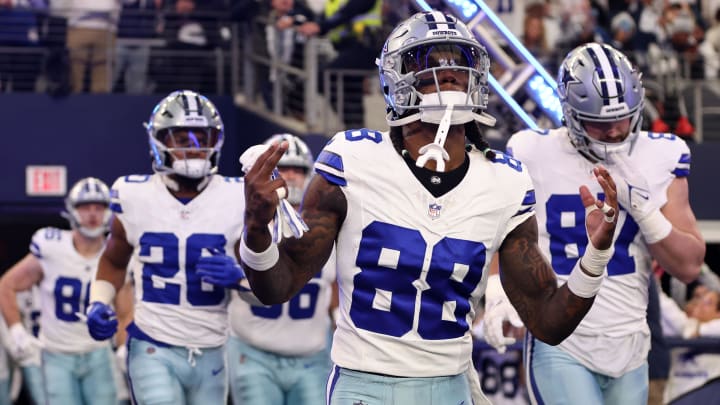Ja’Marr Chase, CeeDee Lamb and Brandon Aiyuk Are Smart for Trying to Get Paid Now

Every once in a while it’s worth reminding ourselves that the salary cap is largely an excuse for owners to cover up their obsession with cheap(er) labor. Cap managers and general managers can almost always make it work. Their bosses pay them handsome salaries to shield the public from their own frugality, which is often applied randomly and senselessly based on whomever the owner last spoke to at the country club.
This is why I mostly find myself rooting for a player during a holdout and especially why I am tracking the simultaneous holdouts (or hold-ins) of Brandon Aiyuk, CeeDee Lamb and Ja’Marr Chase. The prevailing theory is that all of them will be paid sooner or later, and I agree. However, I think we’re not properly addressing the receivers’ collective urgency to get these deals done now.
Why? Let’s take a minute to explore how an owner’s brain works.
This year, the Minnesota Vikings and Justin Jefferson entered a pact worth $35 million per year. Jefferson became the highest-paid nonquarterback in league history. This is undoubtedly the crowning moment of a wide receiver boon that began two years ago, when the Miami Dolphins acquired Tyreek Hill and the Las Vegas Raiders traded for Davante Adams. In the process, both were compensated well above market value, which altered what some agents believed was a stagnant positional market. In short, pass catchers got their due.
Since then, the Raiders have gone 6–11 and 8–9, respectively, with Adams catching 203 balls for 2,660 yards and 22 touchdowns. Adams is not the reason the Raiders are bad, of course. But stay with me. Since the Dolphins signed Hill, the team has made the playoffs twice, though the team’s speed-oriented offense was largely ineffective once it got there due to load management issues or injuries late in both seasons.
The Vikings’ over/under win total heading into this year is 7.5, according to Las Vegas. Imagine the team makes it to a respectable nine wins, stunning nearly everyone in the process. Owners—again, not the people who study the sport and realize these receivers are generational and stunning and immensely valuable when it comes to gameplanning—are going to see this and start falling for the aged trope about receivers’ diminished roles in creating Super Bowl champions. People will tell them that Andy Reid won with and without Tyreek Hill. That Bill Belichick won without Randy Moss. You get where this is headed. By that time, in 2025, Jefferson’s contract will be in the final year in which it will cost less than 10% of the Vikings’ total cap. By that time, I would guess many of these owners will wonder why they are devoting that much money to a player who plays a position that, in their minds, doesn’t directly correlate with them winning many more games.
Again, I’m not saying this (though I speculated a bit after Jefferson was signed). Owners, the people who don’t like spending money, remember? They will think this because it’s cheaper for them to think this. And they will hire people who agree with them to execute this strategy. And, I would imagine, we’ll wait a very long time before the market expands as aggressively at the position as it has over the past five years.
So, that’s why Lamb, Chase and Aiyuk need to get new deals done. That’s why anyone who catches balls for a living should follow them to the picket line. The receiver market is as good as it's going to get, with Jefferson clearly the best player at his position and no generational prospects (as of yet) with the kind of leverage to move that needle. Jefferson, short of throwing the ball to himself and one-hand grabbing it over four defenders in the end zone on every possession, is going to fail to live up to what owners believe is worth paying nearly $40 million per season.
That’s the burden of being a mold breaker and the unfortunate part about playing in a system in which owners are only generous when they are backed into a corner and placed in a firm headlock.
Join me, then, in applauding Chase, Lamb and Aiyuk. Here’s hoping they miss games. Here’s hoping their absences correlate to losses. It’s their only recourse for now in battling back against what will certainly be a growing perception among billionaires who would rather not pay them the same way they have to pay pass rushers and quarterbacks.
